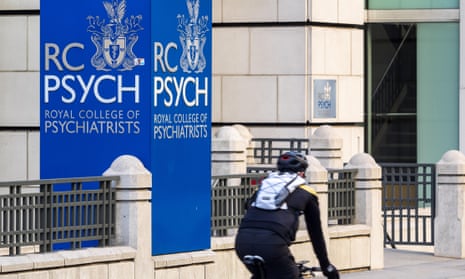England is “in the grip of a mental health crisis” because of the Covid pandemic, with under-18s suffering the most, psychiatrists are to warn on Friday.
Record numbers of children and adults sought NHS help last year for problems such as anxiety, depression and eating disorders, or because they ended up in a mental health crisis.
The Royal College of Psychiatrists has highlighted the sharp rise in mental ill health, that began after the first lockdown in March 2020, in an analysis of NHS and Office for National Statistics data. The college said NHS services were struggling to cope with the demand.
Adrian James, the college’s president, said: “The extent of the mental health crisis is terrifying, but it will likely get a lot worse before it gets better. Services are at a very real risk of being overrun by the sheer volume of people needing help.”
People under the age of 18 have been particularly badly affected, and delays in accessing care are worsening.
The analysis by the college found that:
In 2020, between April and December, 372,438 under-18s were referred for mental health help, the most recorded, and 28% more than the 292,212 referred in the same period in 2019.
Under-18s received 3.58m sessions of treatment in those nine months, 20% up on the year before.
The number of children and young people needing emergency care because they were in a mental health crisis rose 20% to 18,269.
In addition, more under-18s were left waiting for either routine or urgent care for an eating disorder.
Bernadka Dubicka, chair of the college’s child and adolescent faculty, blamed the situation on “the devastating effect that school closures, disrupted friendships and the uncertainty caused by the pandemic, have had on the mental health of children and young people”.
Adult mental health also fared very badly during the pandemic, James said. Until March 2020 about one in 10 adults in England suffered from moderate to severe depression. But that had doubled to almost one in five by last June. Record numbers reported feeling lonely.
And while the number of adults referred for help from April to December 2020 was slightly down on the year before, the number of treatment sessions they had rose from 15.8m to 17.5m.
During that period the highest number of adults ever had to be referred for urgent help because they were in a mental health crisis – 159,347, a level 2.2% up on the same period in 2019.
Andy Bell, deputy chief executive of the Centre for Mental Health thinktank, said: “There is a rising tide of poor mental health resulting from people’s traumatic experiences of the virus itself, of isolation and exposure to abuse, of loss and bereavement, and of financial insecurity and job loss.”
About 10 million people will need help with mental ill health relating to the pandemic, including 1.5 million children, although two-thirds were already struggling before Covid-19 hit, Bell added.
Miriam Deakin, director of policy and strategy at NHS Providers, which represents NHS trusts, said: “While mental health leaders have told us it is difficult to evidence the extent and drivers of the current pressures, a host of factors related to lockdown and the pandemic, including rising pressure on individuals and families and reduced social support, are key factors.”
Nadine Dorries, the mental health minister, said: “I am acutely aware of how difficult this pandemic has been for many, especially children and young people, and I remain absolutely committed to supporting the mental wellbeing of everyone.”
Ministers had provided an extra £2.3bn this year to expand mental health care, and last month unveiled a mental health recovery action plan to help the NHS cope with the surge in demand, especially from young people and health workers, Dorries added.
